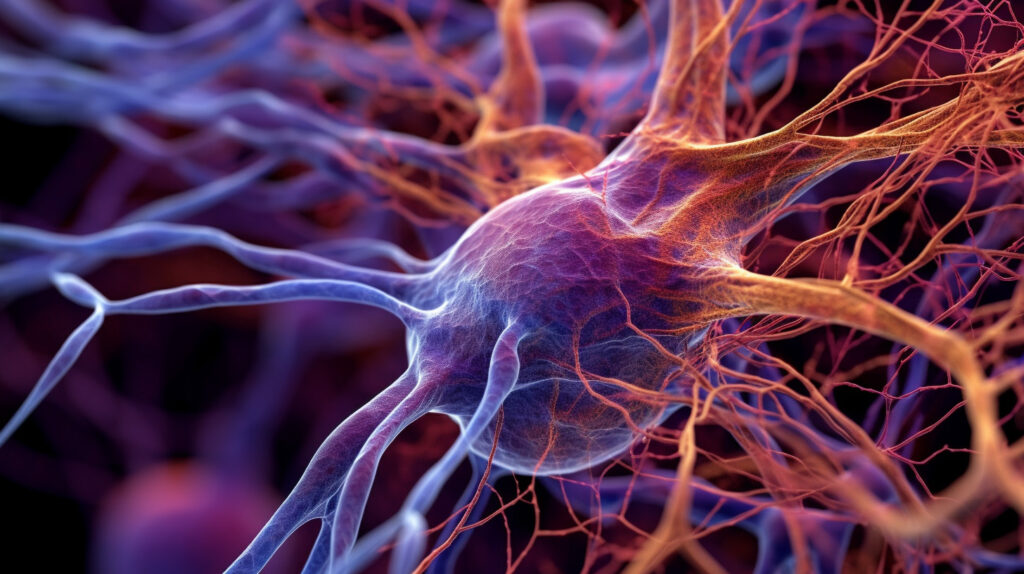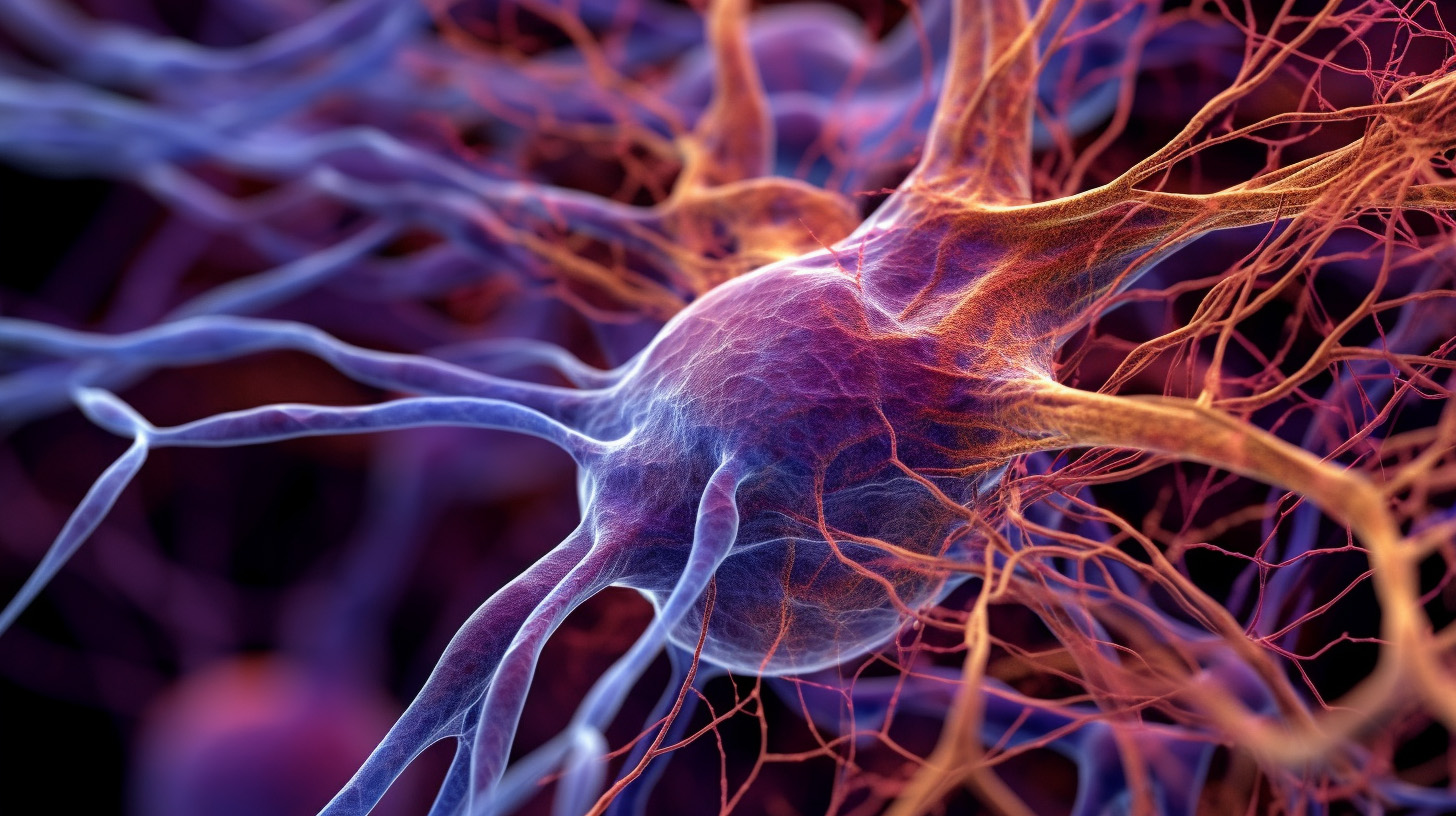TL;DR:
- Lion’s Mane Mushroom, or Hericium Erinaceus, has a history in Traditional Chinese Medicine for promoting cognitive health and overall wellness.
- Lion’s Mane’s cognitive benefits are attributed to its influence on nerve growth factor (NGF) production, which is crucial for neuron growth, maintenance, and survival.
- Unique compounds in the mushroom, such as hericenones and erinacines, promote neurogenesis (the growth and development of new neurons).
- As a dietary supplement, Lion’s Mane supports brain health and mental performance.
- Research shows that it can improve memory, cognitive function, prevent dementia, and potentially help treat Alzheimer’s disease.
- Integrating Lion’s Mane into a nootropic stack may enhance its cognitive benefits.
Imagine a life where you feel more youthful, sharp-minded, and energized. As a health-conscious adult, you constantly strive to improve your cognitive health and overall well-being. That’s where Lion’s Mane Mushroom comes in, a fascinating edible fungus with a long history in Traditional Chinese Medicine (TCM). Kickstart your journey towards a more vibrant and thriving mind with the potent natural nootropic Lion’s Mane Mushrooms! Discover how it can help you think wiser and feel more energized by supporting and boosting your memory, neurogenesis, and cognitive function. Are you ready to make the most out of your brain’s potential? Dive in and witness the power of Lion’s Mane Mushroom!
What is Lion’s Mane Mushroom and How Does it Boost NGF?
What is a brief overview of Lion’s Mane Mushroom?
Lion’s Mane Mushroom, scientifically known as Hericium Erinaceus, is an edible fungus with a long history of use in Traditional Chinese Medicine (TCM). This fascinating mushroom is known for its distinct appearance, resembling a cascade of white icicles. Beyond its aesthetic appeal, Lion’s Mane is revered for its cognitive health-boosting properties, making it one of the most sought-after medicinal mushrooms today.
What is the History of Lion’s Mane Mushrooms?
The use of Lion’s Mane Mushroom for promoting cognitive health and overall wellness dates back centuries within TCM practices. Revered for its ability to nourish the mind and body, this edible fungus was traditionally believed to strengthen memory, and concentration, and even promote longevity. How we no longer have to rely on folklore and hearsay, but instead can use SCIENCE to substantiate the true effects of Lion’s Mane Mushrooms!
What is Lion’s Mane Mushroom Relationship to cognitive health?
The potential cognitive benefits of Lion’s Mane Mushroom are mainly attributed to its ability to influence the production of nerve growth factor (NGF). NGF is a vital protein responsible for the growth, maintenance, and survival of neurons in the human body (Lai et al., 2013). By boosting NGF, Lion’s Mane helps improve nerve communication within the brain, leading to enhanced mental processes and improved long-term cognitive health.
What is Lion’s Mane Mushroom Relation to Nerve Growth Factor (NGF)?
So, how exactly does Lion’s Mane influence the production of NGF? While the mushroom does not contain NGF, it does contain several unique compounds called hericenones and erinacines, which have been found to promote neurogenesis (Mori et al., 2008). Neurogenesis refers to the growth and development of new neurons, and these compounds help stimulate the synthesis of NGF, which in turn promotes neurogenesis.
Lion’s Mane Mushroom as a dietary supplement
Thanks to its cognitive health-boosting properties, Lion’s Mane Mushroom has become a popular ingredient in dietary supplements, especially those targeted at supporting brain health. Incorporating Lion’s Mane Mushroom as a part of a daily wellness routine may help to unleash the full potential of NGF, contributing to improved mental performance and overall cognitive health.
References:
Lai, P.-L., Naidu, M., Sabaratnam, V., Wong, K.-H., David, R. P., Kuppusamy, U. R., …Malek, S. N. A. (2013). Neurotrophic properties of the Lion’s Mane Medicinal Mushroom, Hericium Erinaceus (Higher Basidiomycetes) from Malaysia. International Journal of Medicinal Mushrooms, 15(6), 539-554.
Mori, K., Obara, Y., Hirota, M., Azumi, Y., Kinugasa, S., Inatomi, S., &Nakajima, K. (2008). Nerve growth factor-inducing activity of Hericium Erinaceus in 1321N1 human astrocytoma cells. Biological 7 Pharmaceutical Bulletin, 31(9), 1727-1732.
Scientific Evidence of Lion’s Mane Benefits for Neuronal Health
What are neurotrophic factors and why are they important for Lion’s Mane Mushrooms?
Neurotrophic factors are proteins that promote the survival, growth, and maintenance of neurons, the nerve cells responsible for transmitting information throughout our nervous system. These factors are important in maintaining proper neuronal health, fostering development, and aiding recovery from injury (Pascual and Figueroa, 2017). Lion’s mane benefits stem from its ability to stimulate the production of nerve growth factor (NGF), a type of neurotrophic factor that enhances neuronal health, growth, and proliferation.
How does Lion’s Mane promote neurogenesis?
Neurogenesis is the process of creating new neurons or nerve cells from stem cells. It was once believed that neurogenesis only occurs during early development, but studies have shown it continues throughout life. Lion’s Mane mushroom has been found to enhance the production of NGF and other neurotrophic factors, thus promoting neurogenesis and increasing the resilience of neural circuits. A study by Mori et al. (2009) showed that Lion’s Mane extract improved the number of newly formed cells in the hippocampus, an area involved in learning and memory.
How does Lion’s Mane enhance neurite outgrowth and axonal growth?
Neurite outgrowth is the extension of neuronal processes like dendrites and axons, which helps increase the connectivity between neurons. Axonal growth is important for maintaining the health of neurons by transporting vital substances from the cell body to the terminal areas. Lion’s Mane contains compounds that promote the production of NGF, thereby enhancing neurite outgrowth and axonal growth, which results in more efficient neural communication (Lai et al., 2013).
Which researchers and institutions are researching Lion’s Mane and neuronal health?
Several biomedical research institutions and organizations have been studying the potential neuroprotective and regenerative properties of Lion’s Mane. Some notable centers include The University of Malaya, Japan’s Hokuto Corporation, and The Mushroom Research Center in Thailand. Their research has advanced our understanding of how Lion’s Mane promotes neuronal health through NGF production, neurogenesis, and neurite outgrowth.
What’s the status of biomedical research and clinical trials involving Lion’s Mane?
There is a growing body of biomedical research and clinical trials exploring the various Lion’s Mane benefits for neuronal health. Most research on Lion’s Mane and neuronal health has been conducted on animal models or cell cultures, with a few human clinical trials. A study by Mori et al. (2009) demonstrated improvements in cognitive function for patients with mild cognitive impairment after consuming Lion’s Mane supplements. Further research and clinical trials are needed to fully understand the benefits of Lion’s Mane for human neuronal health and its potential as an effective therapeutic agent.
References:
Lai, P.-L., Naidu, M., Sabaratnam, V., Wong, K.-H., David, R. P., Kuppusamy, U. R., … & Malek, S. N. A. (2013). Neurotrophic properties of the Lion’s Mane medicinal mushroom, Hericium erinaceus (Higher Basidiomycetes) from Malaysia. International Journal of Medicinal Mushrooms, 15(6), 539-554.
Mori, K., Inatomi, S., Ouchi, K., Azumi, Y., & Tuchida, T. (2009). Improving effects of the mushroom Yamabushitake (Hericium erinaceus) on mild cognitive impairment: a double-blind placebo-controlled clinical trial. Phytotherapy Research, 23(3), 367-372.
Pascual, A., & Figueroa, H. (2017). Neuroprotection and biogenesis of neurotrophic factors. Neural Regeneration Research, 4, 619-625.
How Can Lion’s Mane Improve Memory and Cognitive Function?
How does Lion’s Mane support brain function and cognitive health?
Lion’s Mane is a fascinating medicinal mushroom that has been shown to boost nerve growth factor (NGF) levels in the brain (Lai et al., 2013). By doing so, it supports the overall health and functioning of the nervous system, leading to improved cognitive abilities. Due to its unique ability to enhance cognition, Lion’s Mane has become a popular natural nootropic agent.
Can Lion’s Mane improve memory?
Indeed, Lion’s Mane can improve memory. In a study of older adults with mild cognitive impairment, daily supplementation with Lion’s Mane extract over 16 weeks led to significant improvements in cognitive function compared to a placebo group (Mori et al., 2009). The effects were maintained even after the supplementation period ended. This suggests that Lion’s Mane has potential as a memory-enhancing agent, particularly for those experiencing age-related decline.
How can Lion’s Mane enhance learning abilities?
Lion’s Mane not only supports memory but also facilitates learning. The increase in NGF production, which is crucial for neuronal growth and maintenance, promotes the formation of new connections and synapses (Lai et al., 2013). This, in turn, enhances learning performance and makes it easier for the brain to acquire, retain, and recall new information.
What is the connection between Lion’s Mane and mental clarity?
Apart from memory and learning enhancement, Lion’s Mane can also boost mental clarity. This can help individuals feel more focused, energized, and alert. Neurotrophic factors like NGF play an essential role in maintaining the health and plasticity of the brain, which is crucial for optimal cognitive performance (Zhang et al., 2016). Since Lion’s Mane can improve NGF production, these factors work collectively to alleviate brain fog and promote mental acuity.
In summary, Lion’s Mane has an impressive range of potential cognitive benefits, including supporting brain function, improving memory, enhancing learning abilities, and boosting mental clarity. The medicinal mushroom works by stimulating nerve growth factor production and promoting overall neuronal health, making it a valuable addition to a cognitive support regimen.
References:
Lai, P. L., Naidu, M., Sabaratnam, V., Wong, K. H., David, R. P., Kuppusamy, U. R., … & Malek, S. N. A. (2013). Neurotrophic properties of the Lion’s Mane medicinal mushroom, Hericium erinaceus (Higher Basidiomycetes) from Malaysia. International Journal of Medicinal Mushrooms, 15(6), 539-554.
Mori, K., Inatomi, S., Ouchi, K., Azumi, Y., & Tuchida, T. (2009). Improving effects of the mushroom Yamabushitake (Hericium erinaceus) on mild cognitive impairment: A double-blind placebo-controlled clinical trial. Phytotherapy Research, 23(3), 367-372.
Zhang, J., An, S., Hu, W., Teng, M., Wang, X., Qu, Y., … & Wang, D. (2016). The neuroprotective properties of Hericium erinaceus in glutamate-damaged differentiated PC12 cells and an Alzheimer’s disease mouse model. International Journal of Molecular Sciences, 17(11), 1810.
Can Lion’s Mane Help Prevent Dementia and Alzheimer’s Disease?
Is There a Potential Connection Between Lion’s Mane and Dementia Prevention?
Lion’s Mane mushroom has been the subject of various studies in relation to dementia prevention, including Alzheimer’s disease (AD). Its unique compounds, including hericenones and erinacines, have been shown to stimulate nerve growth factor (NGF) production, which is crucial for maintaining and repairing neurons (Lai et al., 2013). NGF may play a significant role in improving cognitive functions and delaying the onset of age-related cognitive decline, as it helps prevent neuronal cell death, a common issue in major neurodegenerative disorders like AD (Chen et al., 2020).
Can Lion’s Mane Combat Alzheimer’s Disease?
Research suggests that Lion’s Mane has potential therapeutic applications in treating Alzheimer’s disease. Recent animal studies have shown promising results, such as the restoration of neuronal functions and improvement of learning and memory abilities in AD-induced mice (Li et al., 2018). This cognitive enhancement is strongly linked to the boost in NGF levels, which supports neuronal survival and neurogenesis (Mori et al., 2008). However, more clinical trials are needed to fully understand the effectiveness of Lion’s Mane in human subjects with AD.
How Can Lion’s Mane Help in Preventing Cognitive Decline?
Lion’s Mane has shown great potential in preventing cognitive decline by promoting NGF synthesis and reducing neuronal cell death. In a double-blind, placebo-controlled clinical trial, older adults with mild cognitive impairment experienced significant improvements in cognitive functions after consuming an oral Lion’s Mane supplement for 16 weeks (Mori et al., 2009). By stimulating the production of NGF, Lion’s Mane may enhance neural plasticity, learning, and memory, ultimately contributing to healthier cognitive aging (Lai et al., 2013).
Can Lion’s Mane Reduce Neuronal Cell Death?
Lion’s Mane exhibits neuroprotective properties that may contribute to reducing neuronal cell death. In vitro and in vivo studies have demonstrated the ability of Lion’s Mane extracts to protect neurons from toxic insults, such as oxidative stress and beta-amyloid peptide formation, both of which are associated with the development of AD (Tsai et al., 2016; Tzeng et al., 2014). By promoting NGF production and displaying antioxidant and anti-inflammatory activities, Lion’s Mane may effectively mitigate cognitive decline and protect against neurodegenerative diseases (Chen et al., 2020).
References:
Chen, C. C., Tzeng, T. T., Chen, C. C., Ni, C. L., Lee, L. Y., & Chen, W. P. (2020). Erinacine A-enriched Hericium erinaceus mycelium produces antidepressant-like effects through modulating striatal and hippocampal serotonin (5-HT) concentrations. Journal of Ethnopharmacology, 246, 112235.
Lai, P. L., Naidu, M., Sabaratnam, V., Wong, K. H., David, R. P., Kuppusamy, U. R., … & Malek, S. N. A. (2013). Neurotrophic properties of the Lion’s Mane medicinal mushroom, Hericium erinaceus (Higher Basidiomycetes) from Malaysia. International Journal of Medicinal Mushrooms, 15(6), 539-554.
Li, I. C., Lee, L. Y., Tzeng, T. T., Chen, W. P., Chen, Y. P., Shiao, Y. J., & Chen, C. C. (2018). Neurohealth properties of Hericium erinaceus mycelia enriched with erinacines. Behavioural Neurology, 2018, 5802634.
Mori, K., Inatomi, S., Ouchi, K., Azumi, Y., & Tuchida, T. (2009). Improving effects of the mushroom Yamabushitake (Hericium erinaceus) on mild cognitive impairment: a double-blind placebo-controlled clinical trial. Phytotherapy Research, 23(3), 367-372.
Mori, K., Obara, Y., Hirota, M., Azumi, Y., Kinugasa, S., Inatomi, S., & Nakahata, N. (2008). Nerve growth factor-inducing activity of Hericium erinaceus in 1321N1 human astrocytoma cells. Biological and Pharmaceutical Bulletin, 31(9), 1727-1732.
Tsai, T. F., Chen, Y. C., Yang, B. Y., Weng, P. F., Chen, W. N., Lin, W. C., … & Chen, C. C. (2016). Hericium erinaceus extracts alter behavioral rhythm in mice. Journal of Functional Foods, 25, 267-275.
Tzeng, T. T., Chen, C. C., Lee, L. Y., Chen, C. C., Lee, K. F., Chen, W. P., … & Chen, C. C. (2014). The cyanthin diterpenoid and sesterterpene constituents of Hericium erinaceus mycelium ameliorate Alzheimer’s disease-related pathologies in APP/PS1 transgenic mice. International Journal of Molecular Sciences, 19(2), 598.
Unlocking the Power of Lion’s Mane: Ensuring Safety and Effectiveness
How do I incorporate Lion’s Mane Mushrooms into my nootropic stack?
To fully unleash the power of Lion’s Mane as a cognitive enhancer and one of the top memory boosters, consider adding it to a nootropic stack. Nootropics are supplements or drugs designed to improve cognitive function, and by combining Lion’s Mane with other nootropics, you can maximize its potential for concentration improvement, focus enhancement, and overall neuroprotection. The suggested dosage ranges from 1000 mg to 3000 mg for optimal nootropic benefits.
Are Lion’s Mane Mushrooms safe?
Nootropics and their benefits are profound, but it’s important to focus on ensuring the safety and effectiveness of supplements. To do this, be sure to consult with a healthcare professional before beginning any supplementation if you are pregnant, nursing, or taking medications. Armed with their guidance, you’ll be ready to confidently integrate Lion’s Mane into your health routine.
What are Key factors to consider when choosing a Lion’s Mane supplement?
Ready to find the perfect Lion’s Mane supplement? Keep these crucial factors in mind. First, look for a product that clearly states its active ingredients and their concentrations. Ensure you use products that are third-party independently tested for heavy metals and impurities are GMP certified, and produced in an FDA-registered and NSF-certified facility. High-quality supplements will always use the fruiting body (the actual mushroom) instead of the mycelium (underground root structure). Additionally, opt for supplements that derive from the Hericium erinaceus species, as it contains the highest concentration of beneficial compounds (Lai et al., 2013).
What are the recommended dosages for optimal Lion’s Mane results?
To experience Lion’s Mane’s brain-boosting benefits, it’s important to get the dosage right. Most studies suggest a daily dose of 500 mg to 3,000 mg of Lion’s Mane fruiting body extract. However, follow the specific instructions provided by your chosen supplement and consult your healthcare professional to determine the best dosage for you (Lai et al., 2013).
Precautions and potential side effects
While Lion’s Mane is generally considered safe, it’s crucial to be aware of potential side effects. Some users have reported mild digestive discomfort, skin itching, or allergic reactions (Li et al., 2014). Note any adverse effects and consult your healthcare professional if symptoms persist or worsen. By taking these precautions, you can safely harness the power of Lion’s Mane and boost your brain for years to come.
References:
Lai, P. L., Naidu, M., Sabaratnam, V., Wong, K. H., David, R. P., Kuppusamy, U. R., … & Malek, S. N. A. (2013). Neurotrophic properties of the lion’s mane medicinal mushroom, Hericium erinaceus (Higher Basidiomycetes) from Malaysia. International Journal of Medicinal Mushrooms, 15(6), 539-554.
Li, I. C., Lee, L. Y., Tzeng, T. T., Chen, W. P., Chen, Y. P., Shiao, Y. J., & Chen, C. C. (2014). Neurohealth properties of Hericium erinaceus mycelia enriched with erinacines. Behavioural Neurology, 2014, 1-9.
##Conclusion
Congratulations, health aficionados! You understand the importance of taking care of your physical and mental well-being, which is why you’re after evidence-based supplements for your joints and brain.
Together we dove into the science behind Lion’s Mane Mushroom and showed the enhancing effect it has on our neuronal health, cognitive abilities, and the prevention of cognitive decline, dementia, and neuronal cell death. We also emphasized the importance of transparency and science-backed information to help you become confident in your choice of supplements.
We want to encourage you to continue putting your health first and pursuing vitality at any age. Remember, investing in yourself is the best possible thing you can do. So why not take the leap and try Lion’s Mane? You never know– it could be transformative!



